Diagnosing fuel problems with a car is relatively easy. You hook up a gauge to the fuel rail, attempt to start the car, and then read the number. However, one of the most annoying things that can happen when you work on cars is finding out that you need to do a specific test, but you don’t own a tool that can perform that test. A fuel pressure tester is one of the special tools that can make you want to smash things if you find out you need one and don’t have one.
We made this guide for you so you can avoid that fate. In it, we’ll look at a variety of testers used in diagnosing fuel pressure issues and review them. We’ll follow up with some tips and tricks and answer a handful of questions from around the web. First, though, we’ll tell you what you need to know to choose the right tester for your project.
- How to Choose a Fuel Tester
- Top 10 Best Fuel Pressure Testers and Accessories 2025
- 1. Best Overall Tester: BETOOLL Pro Fuel Injection Tester Kit
- 2. Easiest to Use Tester: OTC 5630
- 3. Best Budget Tester: Actron CP7818
- 4. Best Premium Tester: OTC 6550PRO
- 5. Best Injector Tester: ALLOSUN Fuel Injector Tester
- 6. Best for Carburetors: 8MILELAKE Tester
- 7. Cheap and Versatile: JIFETOR Fuel Tester
- 8. Best OBD2 Scanner: FOXWELL NT301
- 9. Best Multimeter: Klein Tools MM400
- 10. Best for GM Duramax Diesels: Lang Tools TU-32-6
- A Closer Look at Fuel Pressure Testing
- FAQ
- Wrapping Up
How to Choose a Fuel Tester
A fuel tester is a very simple tool. The most important part is a pressure gauge that reads between 0 and 100 or so PSI. Everything else just adapts them to your car and makes them easier to use. That means there are a few things you must know before you can choose a tester.
The Things You Need to Know First
Most of the following information you can find online or in your car’s manual.
- What the ideal fuel pressure for your vehicle is: Some gauges don’t go beyond 100psi, some go beyond, and others are only meant for between 0-10. You’ll want to make sure your test is accurate by being in the gauge’s range.
- What type of fitting your car has for testing: Many cars have a standard Schrader valve like you’d find on a tire. However, some cars require special fittings.
- What style of fuel system your car has: Knowing what kind of fuel delivery system your car has can save you a lot of time. For instance, if you have a car with an older throttle body injection system, you don’t need to waste money or effort on a port injection tester.
Other Features to Look For
There are a handful of other things you might want out of a fuel pressure tester beyond the basic gauge and hose.
- A case to store the tool in so that it doesn’t get damaged in a drawer.
- A selection of included adapters so that you can use it in a variety of ways.
- A bleed valve to make it easy to release the pressure prior to disconnecting.
- A higher-quality gauge is more accurate and less likely to leak.
- A hook so you can hang it up and watch from a distance.
Additional Tools for Testing
When you are testing for fuel delivery issues, knowing the fuel pressure is only step one. Rather than force you to bounce around the internet looking for other information, we included many of these additional tools on our list. You can head down the page here for a breakdown of the entire process.
As we get into our reviews, keep in mind that there may not be a tester for your specific situation. That’s the unfortunate nature of working on cars sometimes. You’ll have to either go to a dealer and find the special tool for your car or modify a tool to work. Don’t be afraid of buying a cheaper fuel pressure tester just to find out whether or not it’s actually going to fit onto your car before you commit to a quality version.
Top 10 Best Fuel Pressure Testers and Accessories 2025
1. Best Overall Tester: BETOOLL Pro Fuel Injection Tester Kit
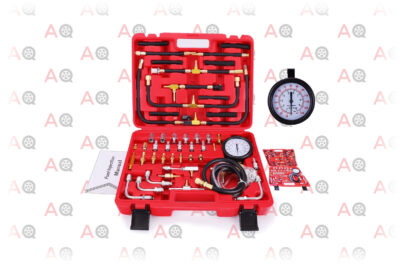
Editor’s Rating:
Who It’s Best For
The BETOOL test kit is a general-purpose diagnostics tool that is useful for anyone who regularly works on cars to own. It has a ton of different fittings, fits a variety of vehicles, and has a case so that the whole thing stays super organized. If someone asks us what pressure tester to get, without any other context, it’s easy to say that it’s this one.
What you don’t get is any emphasis on any one feature. People who just need a cheap tester to run a quick diagnostic won’t like the price. The Actron tester here is just fine for that. At the same time, people who work in a shop won’t like that it’s incomplete. It’s missing some of the specialized fittings and high-quality parts that daily use would require. The OTC 6550 is a better fit.
Most shade tree mechanics and car people fall in between those two extremes, though, and that’s what makes this set such a good value. Just be aware that you might have to pick up a fitting for a few dollars if you own a car on the obscure side.
Our Review
Anytime a tool comes in a case, we like it more. Especially tools like pressure testers with many tiny parts or hoses that can flail around and get stuck in drawers. We also love it when a tool is high-quality without breaking the bank. That means we love the BETOOLS test kit; it’s as simple as that. It does what it says it’s going to do, it’s not likely to break with normal use, and it won’t clutter up your toolbox.
Pros
- Comes with its own case
- It’s a great value
- It’s good quality
Cons
- A little expensive and complicated
- May not have the right fitting for your specific car
2. Easiest to Use Tester: OTC 5630
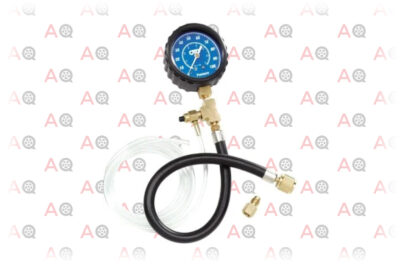
Editor’s Rating:
Who It’s Best For
You’ll see this same thoughts echoed in the Actron CP7818, but many people don’t want to spend much time working on their car. When something breaks, they just want to find out what’s wrong and be done with it. Those people don’t want to spend a bunch on a big, complicated toolset just to do a three-second test. The OTC 5630 is for those people.
It’s easy to use, made of decent quality parts, and is relatively inexpensive. It’s not as inexpensive as the Actron. However, what you get by paying a little more for this OTC is the guarantee that it’s probably going to work right out of the box without any hassle. It’s just a classic “cheap brandless tool vs. Craftsman” debate. Will both of them work? Probably. But the OTC is much more likely to work more than once.
Our Review
There’s no case, and there aren’t enough fittings. Even a simple hose extension with an extra Schrader fitting would go a long way towards improving this set. At the same time, that’s what the BETOOLS set is, and if you want those things, just get that one. It’ll cost you more, though, and you’ll be stuck with a big set that you have to store.
Basically, if you just want to test your car or truck’s fuel pressure to diagnose a problem and don’t want to spend much money to do it, get this tester. It works fine.
Pros
- Easy to use
- Decent quality
- Good value
Cons
- No case
- Lacks some useful fittings
3. Best Budget Tester: Actron CP7818
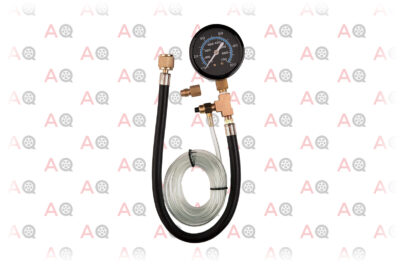
Editor’s Rating:
Who It’s Best For
Most people who own a car don’t regularly work on them. They probably wait until something breaks before they even open the hood. If that describes you, then you probably don’t want to spend a lot of money on a diagnostic tool just to diagnose a single issue. It’s easy to use, doesn’t have extra complications, and you won’t care too much if it gets run over.
That’s where these simple testers come in handy. They aren’t high-quality, and they are really single purpose, but you can hook them to a fuel rail and test the pressure. The OTC 5630 is more or less the same as this Actron; it’s just more expensive and higher quality. Both will absolutely work. Neither come with a case, and they have the same rating. If you are just going to run the test once or twice, save your money and grab this Actron.
Our Review
There’s nothing wrong with the Actron CP7818, and that’s the biggest compliment a cheap tool can get. You just have to know what to expect in order to fully utilize it. Don’t expect a cheap tool to last forever, and don’t rely on it for specialized situations.
In fact, don’t rely on it at all; There is just an inherent risk to buying Harbor Freight levels of equipment that you might get a lemon tool. That’s why we mentioned the OTC 5630 above. The OTC is just a little less likely to be a lemon. A fuel pressure tester is not something you will use often, though, so even if it does turn out to only work once, that’s probably good enough.
Pros
- Very inexpensive
- Easy to use
- Doesn’t have extra parts to lose
Cons
- There might be some quality issues
- Single-purpose
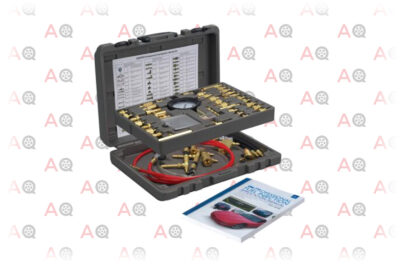
Editor’s Rating:
Who It’s Best For
This is a set for the professional mechanic. It’s unfriendly, has a ton of parts the average person will never touch, and it’s really expensive. However, suppose you are making a living working on cars. In that case, having a full pressure kit like this is absolutely necessary. Even if you aren’t making a living and just working on cars a lot, it’s a fantastic set to have around. Get your friends that come over to drink beer and watch you wrench to pitch in so you have an injection kit you can all use.
Just be aware that this kit isn’t just a pressure tester. Yes, it will do that, but if all you need is to test the rail pressure, then buy the BETOOLS kit instead. The 6550 here is for testing the rail and the injectors and servicing the rail and injectors, and repairing leaking seals if need be.
Our Review
Sometimes reviewing specialty tools can be really difficult because many of them don’t have any alternatives. If you need a test kit that includes injector testers and specialized fittings for testing obscure cars, then you buy this kit. It doesn’t really matter if there are nitpicky little problems with it; you need a tool that can do the job, and this is it.
At least OTC doesn’t make it feel like a bad thing. It’s an expensive tool, but it’s not overpriced. It’s good quality, and the case is really well put together. If you do need to buy one, you won’t feel like you are getting ripped off.
Pros
- Very comprehensive
- The case is well put together and organized
- Good quality
Cons
- Includes a lot of parts you probably won’t touch
- Very expensive
5. Best Injector Tester: ALLOSUN Fuel Injector Tester
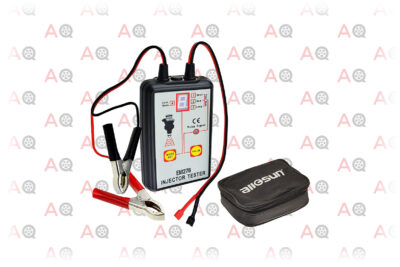
Editor’s Rating:
Who It’s Best For
A fuel injector tester is a tool you need after you use a fuel pressure gauge. If all you are doing is checking the fuel rail, just get the BETOOLS gauge, and you are good to go. The fuel injector tester here is what you get if you want to continue the diagnostic process and find out the issues when the fuel rail tests out ok.
Our Review
The ALLOSUN tester is an inexpensive tester and cleaner. It looks like the more prestigious OTC tester from a distance, but it’s not as high-quality or as versatile. It is, however, very inexpensive. It will also work with most vehicles. It won’t work with diesels; those require a special tester. It’ll be fine for just about anything else, though.
The ALLOSUN is just another tool on this list that you need if you work on cars regularly. It’s not very expensive, works just fine, and is so specialized that there isn’t really anything that can take its place. The leads could definitely be longer, and it won’t survive falling off your bench, but it works fine. Usually, that’s all you need.
Pros
- Inexpensive
- Necessary for diagnosing modern fuel issues
- Works for most gas engines
Cons
- Quality could be better
- You need other tools to fully utilize it
6. Best for Carburetors: 8MILELAKE Tester
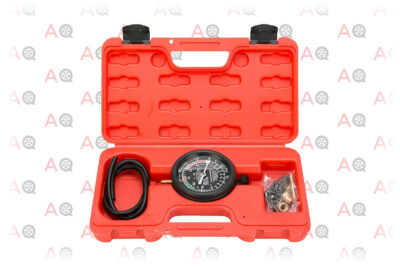
Editor’s Rating:
Who It’s Best For
If you own a car that is on the older side and runs a carburetor, then most of the testers on this list aren’t useful for you. Many carbureted motors don’t even have a fuel pump. However, some have a small fuel pump, and most of them have vacuum-actuated parts. This tester is the right tool to test those systems.
Our Review
The 8MILELAKE test kit is a really standard “gauge attached to a hose” style tester. There are hundreds of different tools that fit the same format. Some are for testing compression, most of the ones on this list are for testing liquid pressure up to 100psi, and this one is for testing pressures that don’t exceed 10psi. Since a standard inline fuel pump is somewhere between 3-6psi, it’s perfect. It’s also inexpensive, which is always a nice bonus.
The downside is that it’s not the easiest thing to work with. Because it’s low pressure, there’s no bleed valve. Plus, it’s cheap, and the fittings are plastic. It’s pretty easy to break those fittings. It’s not a deal-breaker because you can pick up replacements anywhere car parts are sold, and they cost very little, but it can be annoying.
Pros
- Great for older cars
- Multipurpose
- Inexpensive
Cons
- Only good for low-pressure fuel systems
- The design could be better
7. Cheap and Versatile: JIFETOR Fuel Tester
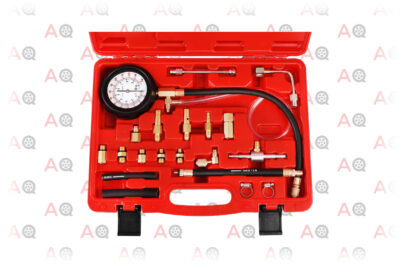
Editor’s Rating:
Who It’s Best For
This tool kit is great for people who really love the idea of owning the BETOOLS kit because it’s more comprehensive and versatile than something like the Actron gauge, but only have the budget for the Actron gauge. It’s a kit that works great for just about any gas engine, and it’s inexpensive enough that anyone can pick one up to have just in case.
Our Review
Just like the Actron, the JIFETOR suffers from some quality control issues. The worst offender is the gauge itself, although we have to give them credit for including a gauge that goes up to 140psi, unlike other budget options. It will probably leak as you use it, which is par for the course when it comes to cheap fittings. It will work for testing a fuel system since the difference between a functioning pump and a malfunctioning pump is usually great enough that losing a few psi to leaks won’t make a significant difference.
What gives this tester a place on our list is the inclusion of a case. We’ve said it before, but we like it when a tool comes with a case so that you don’t have to engineer solutions to stay organized. It’s more complicated than the Actron, but that case might make it your first choice.
Pros
- Very inexpensive
- Comes with a case
- Has a decent amount of adapters
Cons
- Some quality issues
- Not very accurate
8. Best OBD2 Scanner: FOXWELL NT301
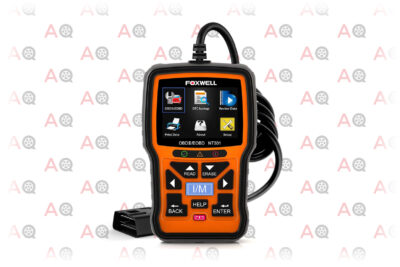
Editor’s Rating:
Who It’s Best For
Just like the Klein multimeter we talk about here, an OBD scanner is a tool that anyone who works on cars should have. We even have an entire guide for them here.
Modern cars have tons of sensors and diagnostic capabilities, and chances are you can diagnose a fuel pressure issue without even needing to open the hood. If you notice that you have a rough idle or slow acceleration, you can check the computer first with a scanner. Chances are that’s all the further you’ll need to go.
If you have a car made before 2010 or so, though, then chances are good that you won’t get enough information from the scanner. You’ll need a pressure tester, too.
Our Review
This FOXWELL scanner is about the middle of the pack regarding price, quality, and functionality. It’s not the fastest, most comprehensive scanner. Still, it’s also much more reasonably priced than the robust diagnostics tablets that your favorite mechanic will have. It’s also easier to use than one of the many Bluetooth scanners, although it does cost more. The screen is easy to read, and it doesn’t require an app.
Long story short, if you are working on cars, you need a scanner. The FOXWELL scanner is decently priced and adequate for most situations.
Pros
- Good price
- Easy to use
- The screen is bright and easy to read
Cons
- Not as much functionality as a tablet reader
- More expensive than Bluetooth readers
9. Best Multimeter: Klein Tools MM400
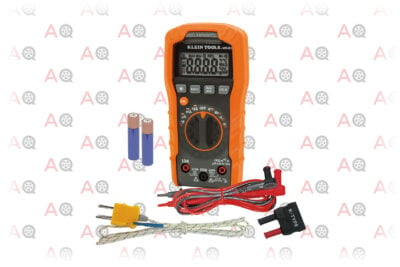
Editor’s Rating:
Who It’s Best For
Every person that works on cars should have a multimeter. To be honest, everyone should own a multimeter; they are just as useful in solving issues in your house as they are for solving issues with your vehicle.
When you find out you have a fuel pressure issue, the next step is to figure out why you have low pressure. Since a bad fuel pump is one of the least desirable issues to have, your first step should be to make sure there isn’t a simple electrical issue. You can save yourself a lot of heartache by spending an hour with a manual and a multimeter.
Our Review
There are tons of cheap multimeters on the market, and honestly, most of them are fine. The reason we recommend this more expensive Klein tool is because it’s good quality and it’s easy to use. Auto-ranging is something you won’t get with cheap meters, but it is necessary to make a meter easy to operate. On top of that, along with Ideal and Fluke, Klein is an industry-standard, so you know it will last a long time.
You may want to spend more and grab a multimeter with an amp clamp like this one. Those can be really useful for diagnosing starter issues, and they are an essential tool for working with car audio. The clamp also makes it easy to hang the meter from your hood latch and free up your hands.
Pros
- Good quality
- Easy to use
- Has a lot of uses
Cons
- A little expensive
- Doesn’t have an amp clamp
10. Best for GM Duramax Diesels: Lang Tools TU-32-6
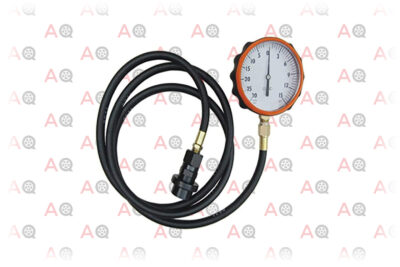
Editor’s Rating:
Who It’s Best For
The quick and obvious answer is that this is the right tool for anyone that owns a GM truck with the Duramax diesel motor in it. You could use it for anything, but it’s so expensive that it’s not really worth it. Even a big kit like the BETOOL one we recommend will be a better purchase if you don’t need to work on a 6.6 diesel.
If you do have a Duramax, though, then at least you can put a different end on it and use it for any motor.
Our Review
We put this tool on our list to demonstrate what some specialized, brand, and car specific tools are out there. It’s not a bad tester, but it’s a whole lot more expensive than a comparable general-purpose tester. Lang Tools can even get away using a mediocre gauge because it’s such a specialized tool that you probably don’t have other options.
The good news is that if you do buy one, it will make your life a lot easier. The alternative is cobbling something together using a mile of plumbers tape, a standard tester, and about 20 trips to the hardware store. The price doesn’t seem so high once you take that into account.
Pros
- Necessary if you own a 6.6 Duramax
- It can be used for any motor if you change the end out
Cons
- Expensive
- The gauge is lower quality
A Closer Look at Fuel Pressure Testing
We want to give you the tools you need to solve your fuel issues. To do that, we have this section here to guide you through the basics and lead you in the direction of the more complicated concepts. To start, let’s look at whether or not you need to do a fuel pressure test in the first place.
Symptoms of Low Fuel Pressure
Low fuel pressure can present itself in a variety of ways.
- Trouble starting
- Loss of power under acceleration
- Rough idle, especially after it’s been running for a while
- Loss of gas mileage
- RPMs won’t climb under load
Fuel System Basics
To be efficient when diagnosing a fuel delivery issue, you should know where the problems could be. The good news is that fuel delivery systems are not very complicated.
To start, the fuel is contained in the gas tank. That’s bolted under your vehicle. Then, on most modern cars, a fuel pump inside the fuel tank pushes fuel towards the engine, usually through a filter between the tank and the motor. At the motor, the fuel gets distributed to injectors via the fuel rail.
Older cars may have a fuel pump mounted in a remote location and often do not have fuel injectors. However, diesel cars and trucks have used fuel injectors for a very long time and will have an additional filter system for separating water from the diesel.
No matter what, it’s helpful to check your fuel filter before jumping to any other conclusions. A dirty fuel filter can cause all sorts of issues, and they are inexpensive to replace.
How to Test Your Fuel Pressure
The following steps are for testing your standard, modern fuel system. Your experience may be wildly different if you have an older or specialty vehicle, so keep that in mind. If you are a visual learner, this gentleman from Actron does a good job going over the basics. You might recognize the tester he’s using as the one we suggest if you are on a budget.
- Attach the gauge to the fuel rail. If it has a hook, hang up the gauge, so you don’t risk it falling and damaging anything.
- Turn the motor over using the ignition switch. A short 5-second burst is usually sufficient.
- Check the gauge and note the pressure.
- Check the gauge again every minute or so for about five minutes and note the pressures.
- Hit the bleeder valve, if your tester is equipped with one, so gas doesn’t spray all over the place.
- Disconnect the tool.
Interpreting the Results
There are not very many outcomes, which makes diagnosis easy.
If….
- The pressure is within 5% and stays within 5% for the entire test, then your fuel system is getting the correct amount of pressure.
- The pressure reaches the required pressure after turning over, but then lowers over time, then your fuel injectors are likely leaking.
- The pressure does not get up to the specified number, then you may have a bad fuel pump.
- The pressure reads higher than specified, then you may have an aftermarket fuel pump. That can be ok. However, it can also mean there is an obstruction or a damaged regulator. If you aren’t sure if you have an aftermarket pump, you may need to do some more diagnostics to find out.
Other Necessary Tools
We mentioned above that testing the fuel pressure is only one step in finding out what can be wrong with a fuel delivery system. Here are some of those tools and how to use them.
An OBDII Scanner
Cars since 1997 are required to have an OnBoard Diagnostic computer. Since it’s the second generation, they call it OBD two, often stylized as OBDII. Often, a faulty fuel pump or low fuel pressure will create fault codes that can be read with an OBD Scanner. You can read a little more about it here, but the error codes themselves are often specific to the vehicle.
Unfortunately, not every vehicle has the sensors necessary to diagnose a fuel pump. An OBDII tool is still a very necessary tool to have if you own a modern vehicle and work on it, so it’s a good idea to grab one even if it can’t directly diagnose your fuel system. We have a great buying guide for OBDII scanners here.
A Multimeter
If you suspect that your fuel pump may have gone bad, a multimeter can confirm that diagnosis. Honestly, just like an OBDII tool, a multimeter is something that anyone who works on cars should have at their disposal. This website has a how-to guide on diagnosing a fuel pump, but there are two basic things to check.
First, make sure that there is the correct voltage being sent to the pump. You can do that by finding the fuel pump relay and testing both sides of the switch for DC voltage. Hopefully, it’s around 12v; otherwise, you have an electrical issue. Second, test the relay itself. Watch this video for that process.
A Fuel Injection Tester
A modern fuel system has two main components: the pump, which is diagnosed with a multimeter, and the injectors, which are tested with the aptly named fuel injection testers. A basic fuel injection tester is a simple plug that is hooked to a power source. You remove the injector and plug it into the tester and monitor the spray.
You can also do a basic diagnostic of the injectors using the multimeter. You’ll have to look up your specific injectors’ resistance rating, then disconnect them and test them for the specified ohms. This site is an excellent resource for diagnosing fuel injector issues, so give it a look if you think you are having that issue.
FAQ
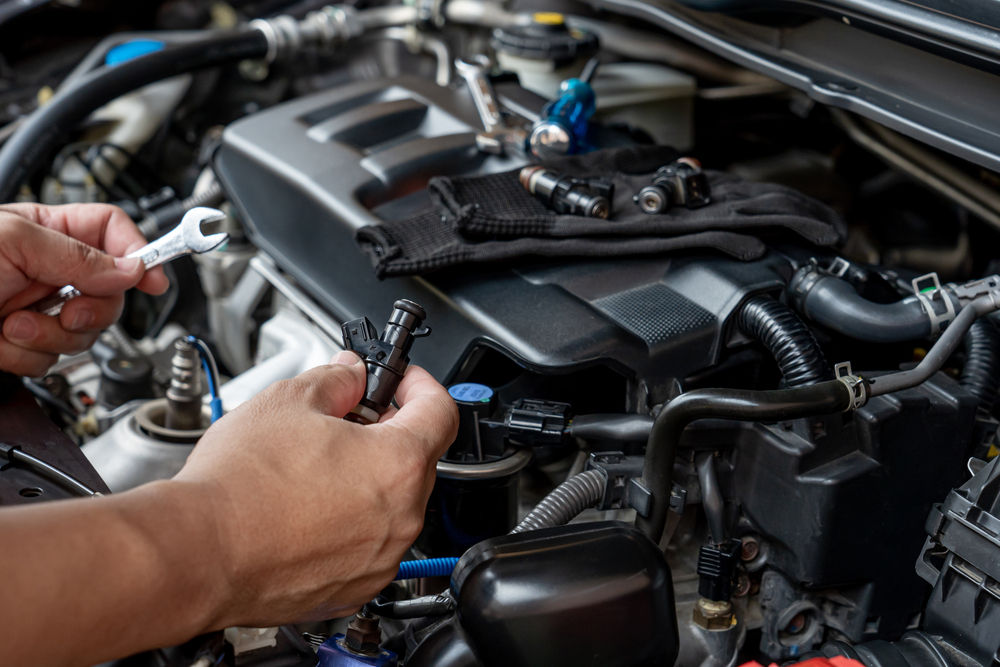
Can a Compression Tester Be Used for Fuel Pressure?
You can use a compression tester as a fuel pressure gauge, but it’s not recommended. First, a compression gauge is often meant to read pressures much higher than a fuel pressure gauge, so you won’t get an accurate reading. Second, they likely won’t have an end on them that is compatible with a standard fuel rail.
What Should My Fuel Pressure Be?
Every car is different. You can find your ideal pressure listed in your car’s manual or after a quick search online. You should find that out before buying a pressure tester just in case you need a gauge that can read higher than 100psi, which is uncommon.
Is Higher Fuel Pressure Better?
High-performance engines often have higher fuel pressures, and people who modify their motors will often do modifications that affect the pressure. However, in general, you want your fuel pressure to be within one psi of specification. If your fuel pressure test comes back higher than normal, it may be because there is an obstruction or your pump is malfunctioning.
What Causes Low Fuel Pressure?
That depends on when you see a low pressure. If the pressure builds to the correct specification but slowly lowers, the fuel injectors are probably leaking. A bad fuel pump will never get to the correct pressure, and a bad fuel filter may make it take longer to build adequate pressure.
Wrapping Up
That’s about all there is to it. If you have a rough time starting your car or lose power going up hills, it might be time to get a fuel pressure tester and open the hood. Hopefully, this guide is what you needed to make sure the process is as frustration-free as possible.
One final tip to leave you with; use a rag like an oven mitt to unscrew the tester from the rail. That way, any residual pressure will get caught in the rag instead of spraying fuel into your eyes, which can be very painful.


